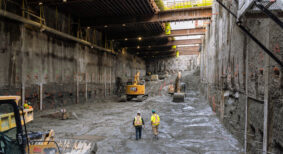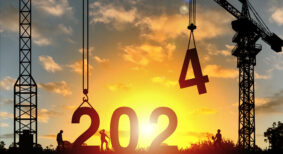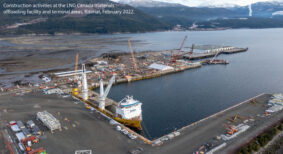Bob Wood, Victoria-based project manager for Houle Electric, is always enthusiastic about being recognized by the Vancouver Regional Construction Association (VRCA). But he is particularly enthused that he and his crew were singled out in the 2013 VCRA Awards of Excellence’s electrical contractor over $2 million category for their work on the Canadian Forces Base (CFB) Esquimalt’s Base Fire Hall and Emergency Response Centre.
That is because the fire hall is, in his words, “the first project of its kind for us and a natural for our security division as well as our electrical team.”
With a value of $4.5 million, the fire hall is one of the largest projects ever undertaken by Houle on Vancouver Island.
The new two-wing, 40,000-square-foot facility replaces CFB Esquimalt’s 55-year-old fire hall, a job that was required partly because new fire trucks are larger and emergency responsibilities are becoming increasingly complex.
Houle has deliberately evolved to keep pace with rapidly evolving technology, and as a result can provide everything from data network infrastructures and custom security solutions.
“In short, we had the wherewithal necessary for the fire hall, which would act as a command post that responds to environmental and civil emergencies in a post-disaster scenario, as well as provide firefighting services for CFB Esquimalt and the immediate surrounding communities,” Wood says.
Wood, along with superintendent Chris Williams and a crew of about 40, were required to provide electrical duplicity and redundancy in order for the facility to remain functional in a worst-case scenario. “This meant providing items such as two 750 kilowatt diesel emergency generators, one as a standby unit,” Wood says. “Everything was overbuilt using the best quality components.”
Houle, which was awarded the project in late 2010, also developed and installed a 120 KVA UPS system to support the computers, air compressors, audio-visual systems and site lighting in the event of a disaster.
“The seismic requirements were extreme and required us to work very closely with the client,” Wood says. Specialized equipment supported the automation controls, audio-visual, video-surveillance, intrusion alarm, access-control, closed-circuit television, inter-communications and fire alarm monitoring (the latter of which monitors more than 200 remote facilities).
At one point Houle even undertook an extensive re-wiring job when it was determined that a different type of wire would be more resilient and reliable in the long run. “That was time-consuming, but again, we were shooting for excellence,” Wood says.
The fire hall was designed to achieve a LEED Silver rating, and Houle’s extensive resources enabled it to gain points with relative ease. “For example, we took on the concept of pre-buying major equipment so that everything could be delivered in three shipments rather than, say, 40, which saved a lot in terms of transport and costs,” Wood explains.
More substantially, Houle developed automation equipment to integrate the bollard, apparatus bay door and gate controls, window status, ventilation, fire signal and fire hall controls, weather station display and stove shutdown controls.
During the course of the 29 months it took to complete the project, complex and expansive lightning protection was installed on the two-tier roof that accommodated dissimilar metal roofing materials, building expansion joints and post-disaster seismic requirements.
Houle earned the distinction of being the first major sub-contractor on site to begin layout and design integration, and the first major sub-contractor to complete its work — including commissioning and training. But for Wood, the most satisfying aspect of the project was watching the reaction of the end users when the facility was completed in the spring of 2013.
“The fire chiefs and their crew love the new building,” he says. “The project was an amazing experience, and seeing the smile on the faces of those who would work in it made the experience perfect.”
Robin Brunet is a freelance writer in Vancouver.









